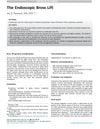 14 citations,
October 2019 in “International Journal of Women's Health”
14 citations,
October 2019 in “International Journal of Women's Health” Menopausal acne is treated with medications and lifestyle changes, but careful choice is needed due to side effects.
 14 citations,
April 2017 in “American Journal of Transplantation”
14 citations,
April 2017 in “American Journal of Transplantation” Skin problems from transplant drugs are common and need careful management in organ transplant patients.
 12 citations,
April 2022 in “Dermatology and therapy”
12 citations,
April 2022 in “Dermatology and therapy” Alopecia areata leads to significantly higher healthcare costs due to more doctor visits and prescriptions.
 12 citations,
July 2016 in “Atlas of the Oral and Maxillofacial Surgery Clinics”
12 citations,
July 2016 in “Atlas of the Oral and Maxillofacial Surgery Clinics” The document concludes that the endoscopic brow lift is a less invasive cosmetic surgery that requires careful technique and patient selection to achieve lasting, aesthetically pleasing results.
 12 citations,
June 2016 in “Clinical and Molecular Hepatology”
12 citations,
June 2016 in “Clinical and Molecular Hepatology” Mycophenolate mofetil can effectively treat autoimmune hepatitis when standard drugs fail.
 12 citations,
October 1995 in “The Journal of Clinical Endocrinology & Metabolism”
12 citations,
October 1995 in “The Journal of Clinical Endocrinology & Metabolism” Skin changes can indicate hormonal imbalances and help diagnose endocrine disorders.
 11 citations,
October 2015 in “Journal der Deutschen Dermatologischen Gesellschaft”
11 citations,
October 2015 in “Journal der Deutschen Dermatologischen Gesellschaft” Women who had bariatric surgery risk nutritional deficiencies causing skin issues during pregnancy and breastfeeding.
 11 citations,
April 2009 in “Pharmacotherapy”
11 citations,
April 2009 in “Pharmacotherapy” Minoxidil can cause deadly skin reaction; monitor patients closely.
 10 citations,
December 2015 in “Clinics in Dermatology”
10 citations,
December 2015 in “Clinics in Dermatology” Diabetes can lead to blindness and skin problems, and managing blood sugar and blood pressure is crucial to prevent these complications.
 9 citations,
July 2002 in “Journal of the European Academy of Dermatology and Venereology”
9 citations,
July 2002 in “Journal of the European Academy of Dermatology and Venereology” The document concludes that fexofenadine reduces inflammation in chronic hives, cholestyramine helps half of pregnant women with itchy rashes, and relaxing incisions are a good alternative in facial surgery for the elderly.
 8 citations,
June 2021 in “International Journal of Molecular Sciences”
8 citations,
June 2021 in “International Journal of Molecular Sciences” Exosomes from umbilical cord cells fix hearing loss and damaged ear hair cells in mice.
 8 citations,
August 2019 in “Dermatologic surgery”
8 citations,
August 2019 in “Dermatologic surgery” Nonsteroid treatments for alopecia areata show promise but need more high-quality research.
 8 citations,
January 2019 in “Acta dermato-venereologica”
8 citations,
January 2019 in “Acta dermato-venereologica” Some children with localized scleroderma are rarely resistant to methotrexate, and no common profile for resistance was found.
 7 citations,
April 2023 in “Frontiers in immunology”
7 citations,
April 2023 in “Frontiers in immunology” Oral baricitinib and ruxolitinib are effective and safe for treating alopecia areata.
 7 citations,
January 2021 in “Biology”
7 citations,
January 2021 in “Biology” Some COVID-19 patients have different skin problems, which might be the only sign of the virus or related to other health issues.
 7 citations,
May 2014 in “Clinical practice”
7 citations,
May 2014 in “Clinical practice” Cooling the scalp may prevent hair loss from chemotherapy, hair often grows back after treatment, and nail issues usually improve after stopping the drug.
 7 citations,
December 2011 in “Elsevier eBooks”
7 citations,
December 2011 in “Elsevier eBooks” The document concludes that early diagnosis and treatment are crucial for managing skin diseases in ferrets.
 6 citations,
May 2015 in “Veterinary Clinics of North America: Equine Practice”
6 citations,
May 2015 in “Veterinary Clinics of North America: Equine Practice” Horse skin diseases are complex to manage and often require a biopsy for accurate diagnosis and treatment.
 5 citations,
January 2016 in “Journal of The American Academy of Dermatology”
5 citations,
January 2016 in “Journal of The American Academy of Dermatology” Skin doctors should know about skin and kidney disease links to prevent serious kidney problems.
 5 citations,
December 2011 in “Drug Research”
5 citations,
December 2011 in “Drug Research” CB-03-01 is a promising skin cream for treating hormone-related skin problems without causing harmful body-wide effects.
 4 citations,
November 2016 in “Pediatric Clinics of North America”
4 citations,
November 2016 in “Pediatric Clinics of North America” The document explains the difficulty in diagnosing and treating brain diseases caused by the immune system and stresses the need for quick and accurate tests.
 3 citations,
January 2010 in “Elsevier eBooks”
3 citations,
January 2010 in “Elsevier eBooks” The document describes various skin conditions, their features, and treatments but lacks detailed study size information.
 3 citations,
January 2000
3 citations,
January 2000 Some alternative therapies for vitiligo show promise but need more research.
 2 citations,
March 2023 in “Frontiers in medicine”
2 citations,
March 2023 in “Frontiers in medicine” A 15-year-old boy's severe scalp condition improved significantly with adalimumab and baricitinib treatment.
 2 citations,
August 2022 in “Emergency medicine international”
2 citations,
August 2022 in “Emergency medicine international” Keloid skin disorder involves abnormal fibroblast activation and immune response, linked to a group of genes including FGF11.
 1 citations,
November 2023 in “Curēus”
1 citations,
November 2023 in “Curēus” Early diagnosis and treatment of nail and skin conditions can improve health and appearance.
 1 citations,
September 2023 in “Journal of drugs in dermatology”
1 citations,
September 2023 in “Journal of drugs in dermatology” Alopecia areata causes unpredictable hair loss and emotional distress, with no cure and limited treatment options.
 1 citations,
April 2022 in “The Egyptian Journal of Hospital Medicine ”
1 citations,
April 2022 in “The Egyptian Journal of Hospital Medicine ” Fractional laser therapy may help regrow hair in alopecia areata.
 1 citations,
June 2021 in “Journal of dermatology and dermatitis”
1 citations,
June 2021 in “Journal of dermatology and dermatitis” Tyrosine kinase inhibitors show promise in treating some skin diseases but their definitive role in dermatology is still unclear.
 1 citations,
April 2019 in “Acta Medica Philippina”
1 citations,
April 2019 in “Acta Medica Philippina” Azathioprine may help treat severe alopecia areata, but more research is needed.






























